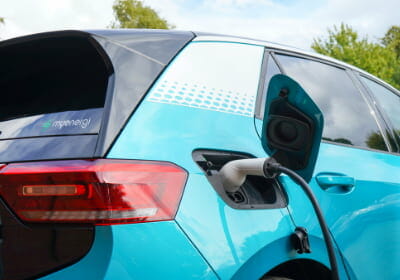Electric Car Insurance Ontario
Electric vehicles were once seen as almost science fiction and were then seen as exclusively for the rich. As they gradually become more affordable, more people in Ontario are purchasing electric cars, each for different reasons. Some are enticed by the increase in charging stations available around the province. Others like the fact that electric vehicles are better for the environment. Yet others like the long-term savings of a longer-lasting vehicle that needs less maintenance and no gas. Regardless of the reason, the demand for these vehicles is increasing, and if you want one, financially protecting yours requires you to have electric car insurance to protect it.
What Is Electric Car Insurance?
Electric car insurance is protection for your electric vehicle. Electric car insurance, like any other auto insurance policy, provides financial protection against physical damage, bodily injury, and liability should you suffer from a loss to your vehicle. With the right electric car insurance and coverages, you can avoid paying for these losses out-of-pocket, as your insurance provider will cover them.
Who Needs Electric Car Insurance?
Anyone who owns an electric vehicle must have electric car insurance. If you own a vehicle in the province of Ontario, it is mandated by the government that you have insurance in the event of a claim. However, unlike other forms of insurance, car insurance is mandatory, regardless – if you use a gas vehicle, an electric car, or a hybrid car.
If you already own a vehicle, you should already have car insurance. Changing your current vehicle insurance to electric vehicle insurance may be as simple as any vehicle substitution you’ve done in the past. Contact a Morison Insurance broker to ensure you have the mandatory coverages and review other features and options available to you.
What Is Considered An Electric Car?
An electric car is a vehicle that uses an electric motor and batteries for power to move. To charge and recharge the batteries, the vehicle must be plugged into a wall charging outlet or a charging station. Plug-in Electric vehicles (EVs) must be regularly hooked up to an EV charger to recharge their batteries. A Tesla would be an example of an electric car.
All-electric cars are different from plug-in hybrid electric cars (PHECs), which use an internal combustion engine powered by gasoline and batteries to power an electric motor. Generally, once the electric batteries are out of power, the car changes to use the gasoline-powered engine.
There are several makes and models of electric vehicles available for purchase. The distance an EV driver can travel before recharging the electric car battery varies by make and model. More public charging stations are being installed across Ontario, which will increase charging convenience. The time required to charge an electric vehicle also varies based on several factors.
If you want to learn about fuel consumption, Natural Resources Canada has an easy online tool to compare fuel consumption for different vehicles.
What Does Electric Car Insurance Cover in Ontario?
Electric car insurance covers various expenses related to electric car accidents, losses and claims. This includes liability coverage for bodily injury and property damage, accident benefits insurance for items such as medical bills and lost wages due to an automobile accident, and collision and comprehensive insurance coverage to cover repair costs if a vehicle is damaged. An auto insurance policy will provide the same coverage to an electric car as it would for a gas-powered vehicle, hybrid or luxury vehicle if you are sued due to an auto accident.
Many insurance coverages are available, and there are always opportunities to increase the coverage on your electric car insurance policy. If you want to know what your insurance covers you for, contact your Morison Insurance broker, who will be more than happy to walk you through all of your auto insurance options and choose the best coverage for your needs.

What Makes Electric Car Insurance Different Than Insurance For Other Cars?
For the most part, electric car insurance is the same as insurance for other vehicles, although there are some small differences. Electric vehicles offer a green vehicle discount which can reduce the cost of insurance, but they also tend to have a higher replacement cost due to their parts costing more on average. Despite these differences, the factors in determining the cost of your car insurance are the same as they would be for a gas-powered vehicle or a hybrid. If you have any questions on the difference between electric car insurance and traditional car insurance, contact your Morison Insurance broker, and they will be happy to answer any questions you may have.
Is Electric Car Insurance More Expensive?
Insurance for an electric car is not inherently more expensive than auto insurance for traditional gas-powered cars. On the surface, electric car insurance may seem more costly than insurance for other vehicles, but that is due to the increased average replacement cost of electric vehicles. An electric and gas-powered vehicle with the same replacement cost will generally be -similar in cost – to insure for physical damage, assuming all other factors are also equal.
Electric car insurance premiums vary from driver to driver depending on numerous factors, including how long the driver has been licensed, if the driver has any tickets, convictions and/or accidents, the driver’s driving history, and what the vehicle is used for. There also may be green vehicle discounts available for additional auto insurance savings. Ask your Morison Insurance broker for details on this and other ways you can save on your electric car insurance.
An auto insurance premium is an amount we pay to insure our vehicles. The bulk of our insurance premium goes to “road-and-driving” coverage. This takes into account our responsibility to society should we cause an event where property is damaged or others get hurt. These exposures are the same whether you drive an electric vehicle or a vehicle fueled by other energy sources.
The cost to repair a vehicle, the value of a car, where a vehicle is garaged, and how often it is driven are factors that contribute to the price of physical damage coverage. Often, newer vehicles will generate a lower annual premium because they are considered very safe, having been manufactured with safety features not offered in years past, such as cameras and autonomous emergency braking.

How Much Does Electric Car Insurance Cost?
Electric car insurance does not have a set cost due to the large number of variables involved. The average cost of premiums for electric car insurance can range from $1,700 to $4,600 per year. The annual cost of electric car insurance is determined by numerous factors, including the insurance provider you choose, where you live, the age of the driver, the number of years licensed, driving record, claims record, use of vehicle, distance driven, and year, make and model of your electric car, the specific coverages you choose, and many others.
Below is a table with some sample pricing from actual quotes to provide a general snapshot of some electric car premiums. Remember that annual insurance premiums will vary depending on your specific circumstances. An insurance broker will help you to get a variety of competitive electric car insurance quotes based on your particular needs.
No green discounts have been applied because these are very specific to the insured. Be sure your insurance broker uses all of the discounts you are eligible to receive, as there can be substantial savings on your auto insurance.
|
VEHICLE (new model) |
APPROX. PRICE (per year) |
|
Chevrolet Bolt |
$1,802 – $4,360 |
|
Hyundai Kona Electric |
$1,862 – $4,598 |
|
Nissan Leaf |
$1,763 – $4,160 |
| Tesla Model 3 |
$2,176 – $4,200 |
*The prices above were provided with the assumption that the driver had a good driving record (no previous tickets or accidents).
What Factors Determine The Rates Of Electric Car Insurance?
The rates for electric car insurance are determined by a large number of factors. These factors include, but are not limited to:
- The replacement cost of the vehicle being insured
- The driving records and years of experience of all primary and secondary drivers
- What the vehicle is being used for
- The level of coverage desired by the insured
- Age of the vehicle
- Distance driven
- General vehicle use
- The Insurance company providing coverage
Please note that this is not a complete list. If you would like to learn more about the factors that determine the rates involved in determining an electric vehicle insurance quote, your Morison Insurance broker will be happy to answer any questions when you begin your electric car insurance quote.
How Can I Lower My Rates For Electric Car Insurance?
Since many of the factors that determine the rates of electric car insurance are under your control, you can do a few things to lower yours. Here are a few examples of things you can do to lower your insurance rates:
- Have a clean driving record
- Drive more cautiously to reduce the chances of future accidents
- Take advantage of the winter tire insurance discount
- Increase your deductible
- Bundle your home and auto insurance
- Maintain your electric car
Please note that these are not the only actions you can take. Your Morison Insurance Broker would know more ways that you would be able to save money on your electric car insurance. If you contact them to begin a electric car insurance quote, they would be more than happy to assist in finding additional ways to help you save.
Is There An Insurance Discount For Electric Cars?
Some insurance companies offer green vehicle discounts when you insure an electric car or hybrid vehicle. Most electric cars also have an automatic-braking system on the vehicle, which can qualify for an additional discount with some insurance companies. These green driving discounts are in addition to dozens of other money-saving car insurance discounts you may qualify to receive, such as claims-free, clean driving record, multi-policy, and many more. If you would like to get as many discounts as possible, your Morison Insurance broker would be happy to lend you a hand in saving money.

Does Electric Car Insurance Cover Hybrid Vehicles?
Despite technically being different vehicles, a hybrid vehicle and an electric vehicle both follow many of the same rules regarding insurance, as they are both eligible for the green vehicle discount. Moreover, electric and hybrid cars follow many of the same rules as gas-powered vehicles. If you have any questions about the differences between electric car insurance, hybrid vehicle insurance, and traditional gas-powered car insurance, your Morison Insurance broker will happily answer them.
Where Can I Get A Quote For Electric Car Insurance?
You can get an electric car insurance quote from the insurance experts at Morison Insurance. Our brokers will provide you with multiple insurance quotes to get you the best insurance coverage and the right price. Get started today by calling 1-800-463-8074 or by filling out the contact form on our website.
100+ Years
Online Reviews
Specialist Team
Clients Money

